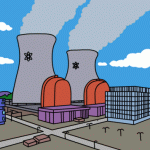Nukes
The Fukushima stuff was all very exciting, and doubtless still is if you live nearby (James?). But it does seem to lead to high levels of drivel from the more soppy-hand-wringing Guardianista types:
We had a pretty good warning earlier this year, when the tragic earthquake and tsunami in Japan caused an even bigger tragedy when the Fukushima nuclear power plant suffered a meltdown
The tsunami killed 20k people, or whatever. Fukushima killed no-one, directly, though it wouldn't be surprising if it kills a few eventually. So why was Fukushima an "even bigger tragedy"? Perhaps Kate Sheppard is…
Nukes in Japan are going off like badly-racked champagne bottles, and the only thing fiercer than the radiation levels is the press circus (I liked that as a sort of simile-thingy, but actually at the moment the radiation levels aren't desperately fierce). How do you folks without blogs manage to bottle up your excitement without writing stuff? Perhaps you actually talk to people, how last-century. Anyway, taking advantage of a brief surge of SB uptime (still dunno what is going on, some people don't see any problem, but it was down for me all last night):
Some people are using the disaster…
Recognizing the drawbacks of uranium reactors, Mike the Mad Biologist explains that using thorium for nuclear fuel would produce safer energy. Uranium was originally established as the element of choice "since it would yield plutonium which could be used to build nukes," but thorium reactions produce less waste, less radioactivity, and no leftovers for warheads. Because of its other properties, thorium also works in new reactor designs that are safe from the threat of meltdown. On Effect Measure, Revere shows us the result of an unsafe workplace at a Dupont chemical plant which suffered…
This weekend, ScienceBloggers discussed the virtues and downfalls of a world run on modern nuclear power. Benjamin Cohen sparked the dialogue on The World's Fair with an interview with author and environmentalist Rebecca Solnit, famous for her opposition to nuclear power. Within just a few hours, Built on Fact's Matt Springer responded, categorically arguing against Solnit's piece and citing events at Chernobyl as an overly hyped specter. "Chernobyl is to modern nuclear power as bloodletting is to penicillin," he says. Ethan Siegel followed in suit on Starts with a Bang, where he offered…
If you were king for a day (or President for a century), could you slow the course of climate change? This Flash game from the BBC challenges you to create a carbon-neutral future, while still maintaining your coffers--and your presidency.
With international carbon-reduction treaties to contend with, and policy suggestions like, "Privatize Electricity", it takes more than a curbside recycling program to succeed in this game:
Clearly, my own leadership leaves plenty to be desired.
Hat-tip, Josh Rosenau, coturnix.
This Wednesday, the world will officially creep closer to nuclear apocalypse, according to the Doomsday Clock maintained by the Bulletin of Atomic Scientists.
The symbolic Doomsday Clock counts down the minutes to midnight, which represents the moment of global disaster. The Clock is currently set at seven minutes to midnight and will, presumably, move forward on Wednesday.
"The major new step reflects growing concerns about a 'Second Nuclear Age' marked by grave threats, including: nuclear ambitions in Iran and North Korea, unsecured nuclear materials in Russia and elsewhere, the continuing…
For those of you who missed it, the Pentagon resumed above ground nuclear testing--sort of.
The test, called "Divine Strake," involved a 700-ton chemical explosive--the largest conventional explosive ever detonated at the Nevada nuclear test site. Initially, the Pentagon told the press the test was intended to help determine whether conventional weapons could be used as bunker busters.
But, as anti-nuclear activist Andrew Lichtman speculated, and the Pentagon later refused to confirm or deny, the test may in fact have been intended to simulate the effects of a low-yield nuclear weapon.
For…
There's been a lot of talk recently about the Seymour Hersh article in the New Yorker discussing the White House' plans for stopping Iran's nuclear program, which claims:
One of the military's initial option plans, as presented to the White House by the Pentagon this winter, calls for the use of a bunker-buster tactical nuclear weapon, such as the B61-11, against underground nuclear sites.
Someone at the Seed office asked the question, "Is a nuclear weapon really the only way to destroy an underground bunker?"
I decided to look into it....
I emailed several scientists who've worked on the…
